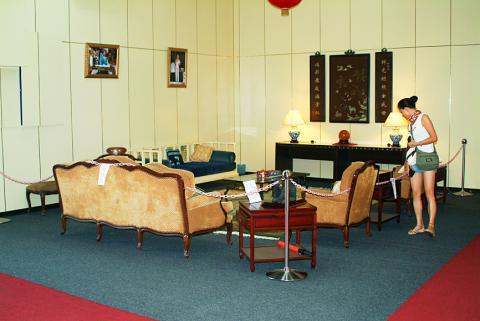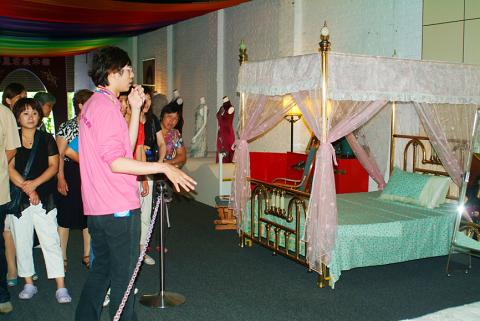Arriving at the first ever museum dedicated to Teresa Teng (鄧麗君),
the 20th century’s best-known Mando-pop singer, I couldn’t help but feel surprised.
It’s not located in central Kaohsiung City or even a business, commercial or artsy district as one might expect, but amid a group of warehouses along a section of Kaohsiung’s Love River with few shops or other businesses.

Photo Courtesy of Today Color
The only thing that sets the building apart from the other warehouses is its white walls — and the row of tour buses parked outside.
Perhaps even more surprising is just how far most of the museum’s visitors have come to see it. Since The Teresa Teng Memorial Hall (鄧麗君紀念文物館) opened in April this year — 15 years after the singer’s death from an asthma attack in 1995 while on vacation in Thailand at the age of 42 — it has seen 600 to 700 visitors a day. More than 90 percent of them come from China, according to Teng’s eldest brother, Teng Chang-an (鄧長安), who set up the site.
Huang Yan (黃燕), a 39-year-old tour guide from Shanghai, said she never tires of listening to Teng’s songs or watching her videos, even though she hears them repeatedly on the tour buses.

Photo Courtesy of Today Color
She remembers a time in China when Chinese Communist Party officials told people not to listen to Teng’s songs because she was from Taiwan, the “renegade province.”
“But in the early 1980s, we secretly listened at home. Even though they banned her songs, there were people who would secretly listen,” Huang said. “As far as I know, no one actually got in trouble for it. The officials also liked her songs. It was just politics, because she was from Taiwan. They said her lyrics would have a negative influence, but that was all nonsense.”
On a recent visit, tourists of all ages streamed into the museum with excited looks on their faces — seemingly oblivious to the strange warehouse setting — as they were led into a room where they intently watched a video about Teng’s early years.
Her father was a military man, and after the Kuomintang (KMT) lost the civil war to the Communists, he moved to Taiwan. His daughter showed talent for singing from a young age, charming families in the military village where she grew up. Her father, recognizing her potential, agreed to let her drop out of high school and pursue a career as a professional singer.
The walls of the 250-ping (825m2) museum are decorated with pictures, large and small, of Teng. A wide assortment of items from Teng’s personal life are on display, ranging from a Mercedes Benz she bought in 1994, a year before her fatal asthma attack, to large glass cases of her on-stage jewelry, mannequins dressed in her glamorous dresses, and even a mahjong table.
“Teresa Teng’s mother loved to play mahjong. Despite her busy schedule, Teng still found time to play mahjong with her mother,” the tour guide said.
The last stop is the souvenir shop — oddly, the only place in the museum where visitors can hear Teng’s music. A large TV continuously plays DVDs of her performances. There’s even a shimmering disco ball. With her most famous and popular songs playing — including Small Town Stories and The Moon Represents My Heart — it’s easy for fans to linger.
And that’s exactly what a small group of Chinese tourists did: They watched the DVD quietly, paying no attention to the gift items or their fellow tourists.
A tourist from Xi’an, China said there was only one way to explain why she loves Teng’s songs: “They’re beautiful.”
“I first heard her songs in the early 1980s when I was in my 20s. I was just starting to work. I thought her songs sounded great, her voice was so gentle and beautiful. I’ve liked her ever since then. Her voice is very unique,” Xu Min (徐敏) said.
She added: “I feel so touched being here. In the 1980s, even though we knew she was from Taiwan, we thought she was one of us, like a family member.”
Another tourist said Teng’s songs cheer people up.
“Her songs make me feel light-hearted, even now. They make me feel better,” said Li Cong (李琮), 40. “When we go to karaoke bars, we often sing her songs.”
Teng was the first person of Chinese descent to perform at the Lincoln Center and the first Asian woman to perform at Caesar’s Palace in Las Vegas, but her brother believes that it is the working class, people with hard lives, who appreciated her songs the most.
“They were often played in work places, easing the pressures of work,” Teng Chang-an said.
Her songs were of particular import to those living in China. “They had just come out of the Cultural Revolution, listening to revolutionary songs,” he said. “Her songs were like a breakthrough for them.”
“Some government agencies and private entrepreneurs wanted to open a memorial hall for the performer, but ... we didn’t want it to be commercialized. So we decided to open the memorial hall with our own funds,” Teng Chang-an said. “We’re not so concerned about making a profit. This is to fulfill her dream of contributing to society.”
He admitted the museum is not adequate and said he hopes to do better.
“I hope to raise enough money in three years to build a permanent memorial hall so that her spirit and songs can be passed down to future generations,” he said.

Towering high above Taiwan’s capital city at 508 meters, Taipei 101 dominates the skyline. The earthquake-proof skyscraper of steel and glass has captured the imagination of professional rock climber Alex Honnold for more than a decade. Tomorrow morning, he will climb it in his signature free solo style — without ropes or protective equipment. And Netflix will broadcast it — live. The event’s announcement has drawn both excitement and trepidation, as well as some concerns over the ethical implications of attempting such a high-risk endeavor on live broadcast. Many have questioned Honnold’s desire to continues his free-solo climbs now that he’s a

Lines between cop and criminal get murky in Joe Carnahan’s The Rip, a crime thriller set across one foggy Miami night, starring Matt Damon and Ben Affleck. Damon and Affleck, of course, are so closely associated with Boston — most recently they produced the 2024 heist movie The Instigators there — that a detour to South Florida puts them, a little awkwardly, in an entirely different movie landscape. This is Miami Vice territory or Elmore Leonard Land, not Southie or The Town. In The Rip, they play Miami narcotics officers who come upon a cartel stash house that Lt. Dane Dumars (Damon)

Francis William White, an Englishman who late in the 1860s served as Commissioner of the Imperial Customs Service in Tainan, published the tale of a jaunt he took one winter in 1868: A visit to the interior of south Formosa (1870). White’s journey took him into the mountains, where he mused on the difficult terrain and the ease with which his little group could be ambushed in the crags and dense vegetation. At one point he stays at the house of a local near a stream on the border of indigenous territory: “Their matchlocks, which were kept in excellent order,

Jan. 19 to Jan. 25 In 1933, an all-star team of musicians and lyricists began shaping a new sound. The person who brought them together was Chen Chun-yu (陳君玉), head of Columbia Records’ arts department. Tasked with creating Taiwanese “pop music,” they released hit after hit that year, with Chen contributing lyrics to several of the songs himself. Many figures from that group, including composer Teng Yu-hsien (鄧雨賢), vocalist Chun-chun (純純, Sun-sun in Taiwanese) and lyricist Lee Lin-chiu (李臨秋) remain well-known today, particularly for the famous classic Longing for the Spring Breeze (望春風). Chen, however, is not a name